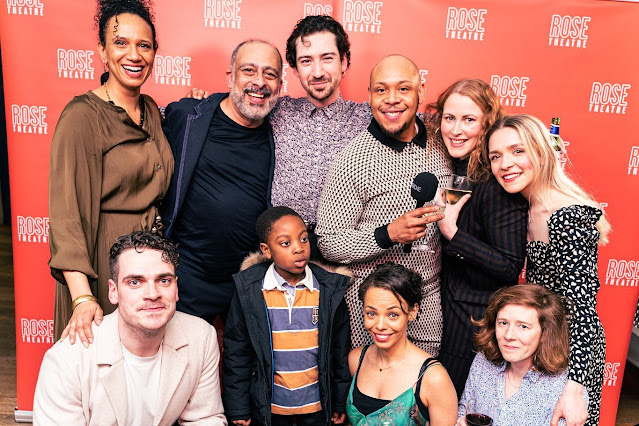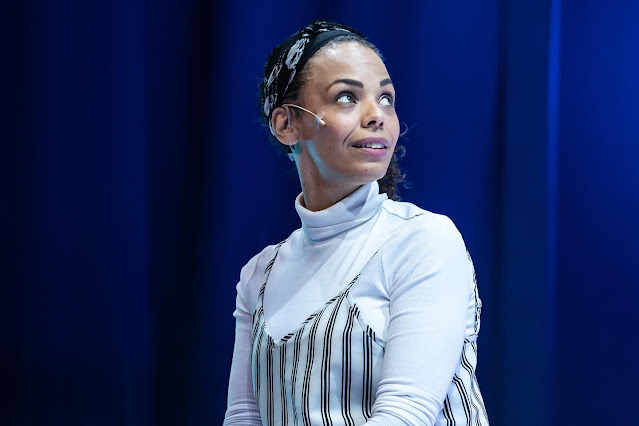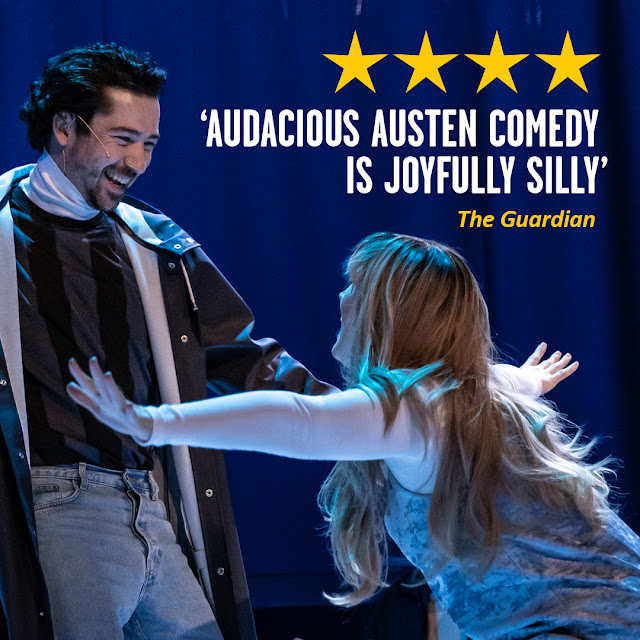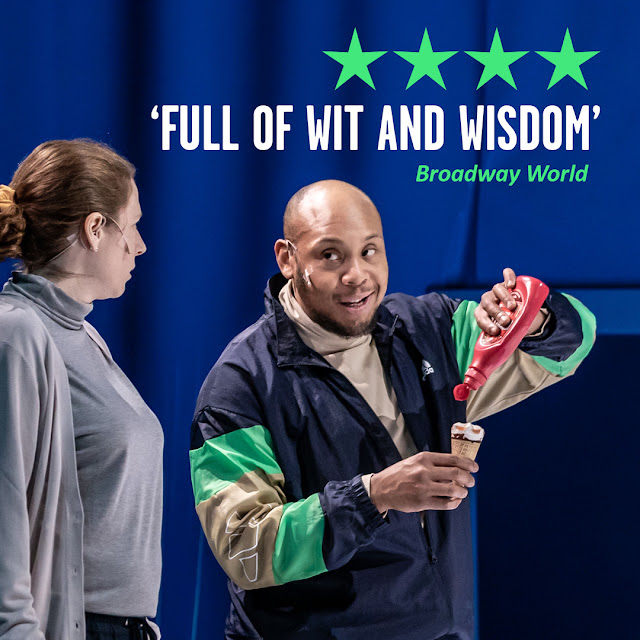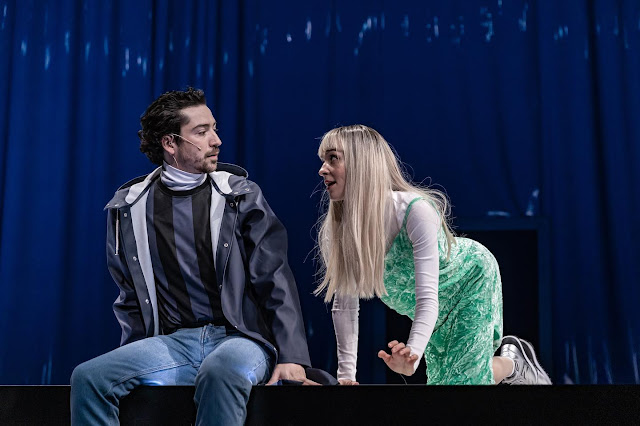Marilyn and I went to see Persuasion performed at The Rose
on Tuesday 8th March. It maybe strange but for somebody who professes to know a little
bit about Jane Austen it is a long time since I had actually read the novel. I
have delved deep into Austen’s novels over the years for quotes and to
reference her possible thoughts and
ideas about life and love, but I have
failed to read the whole of the novels since I first read them all years ago.
I have lost sight. I think, of what Jane actually wrote. So I read
Persuasion again and it wowed me. It is a novel that explores the shifting of
society in the early 19th
century when much was changing, not just how relationships developed, but the class sytem was adapting and it was the time of the Industrial Revolution. It seems apposite that at the moment when the
world order is actually changing that The Rose Theatre chose Persuasion to
dramatise.
I know that good novels, as you read them again over time and as your own experience of life develops, reveal different levels of understanding. So what did I get from reading Austen’s Persuasion this time round before seeing the performance? The word ,persuasion, is used at times during the novel, but not often. The actual consequences of being persuaded however are felt throughout and drive the novel itself. Anne Elliot was persuaded , eight years previously, by her father to refuse a marriage proposal to Captain Wentworth who she really loved. Also Lady Russell the family friend and Anne’s particular friend persuaded her against the match too.
I find Ann annoyingly neurotic. Is that because she has always been pressured
by others to go against her own wishes? Does she feel she has no
control over her life?. Things happen to Anne. She isn't allowed to make things
happen for herself. She analyses every situation, almost every word and look to
an intense degree. She always comes out
worst. In this novel and in the play she eventually learns to decide for herself.
So a major theme has to be how we use people’s advice and how much we should be
persuaded when making life decisions for ourselves.
Anne played by Sasha Frost.
Another issue also,
in terms of Jane Austen’s own experience
are the relationships she describes. How a woman who
never married and who as far as we can tell from the little evidence remaining
in her letters, never had a long term and deep relationship, write about relationships
that are so real? Trust, understanding,
empathy, a deep love, passion, lust and
sex, how can she possible know? How can she create and explore characters that
have deep emotional relationships, that develop over time? How did she know all this? Reading Persuasion again and seeing this stage
production makes me wonder even more. I suppose we all learn more from failure
than success. Maybe it was Jane’s failures in love that informed her at such a
deep level?
Captain Wentworth played by Fred Fergus and Louisa played by Matilda Bailes
A novel written in the early 19th century translated into a play set in the 21st century,
surely, it can’t be done? They are two worlds far apart. How can they
possibly come together and meet? There are the wise among us that say Austen is
universal in her treatment of relationships. This is true when you drill down
to what happens in a relationship but all those 18th century rules
get in the way to a translation across
centuries, surely? Class status, wealth, attitudes to money and the patriarchy and what seems to us blatant misogyny but
wasn’t understood as such in the 18th century, how does it all get
transferred to the 21st century? When I read Persuasion again
finishing the day before we saw the stage adaptation I couldn’t see anyway that
it was possible to achieve that transfer from the 18th century to
the 21st century.
Charles played by Dorian Simpson and Mary played by Caroline Moroney.
Think about science fiction, worlds which are created and can’t
exist in reality. This play creates a hybrid world that is half 18th century and half
21st century. Of course there has to be Sir Walter Elliot, class riven thinking about his baronetcy and
getting into debt. Elizabeth too is the,” perfect,” 18th century
catch, schooled in all the propriety of 18th century family and
filial traditions. Which self respecting 18th century country
gentleman or member of the aristocracy couldn’t fail to want her as his
accomplished bride? She awaits in agonising suspension both in Persuasion the
novel and this staged version. I almost feel sorry for her . She is
totally unfulfilled. We have the
predatory Mrs Clay, named Penelope in
this play and the equally predatory,
nephew and cousin, Mr William Elliot. Kellynch Hall is rented to Admiral and Mrs
Croft. Admiral and Mrs Croft are as loveable as they are in the novel and as
clueless about who will marry whom. What transfers easily are the many misunderstandings
of who is going to marry whom. Its almost like A Midsummers Night’s Dream in
its mistaken who loves who scenarios. The Musgroves, Charles and Mary, Louisa
and Henrietta are the upwardly mobile types and perhaps represent a 21st
century married couple in embryo. Mr and
Mrs Musgrove, their older parents represent the past. The Musgroves as a whole
family represent a changing society. Lady Russel, a family friend and near
neighbour to Sir Walter is as likeable as she is in the novel. She is Annes
true friend. She makes mistakes and get things wrong in her advice to Anne but you always feel her heart is in the right
place and she is willing to adapt her views.
The first scene is when Sir Walter decides to rent Kellynch Hall and go to live in Bath. Anne ,who really doesn’t like Bath delays the inevitable by going to stay with her sister Mary at Marys home three miles away at Uppercross. Things like dates and distances are highlighted in this production in a comical way,making fun of what was significant in the 18th century and really is not now.
Mary can’t cope with anything, her unruly children,
her disaffected husband Charles and she generally sinks into a sort of
hypochondria always feeling ill and suffering stress. Only one of Marys children features in this production . He is named ,Samuel, although the children in the novel are merely called, “the children.” Samule has an accident and damages his
collar bone. Anne is the only one able
to cope of course. Mary tries to escape the action whenever she can. So,
all true to the novel so far. Certain things work in both centuries.
We are informed that Captain
Wentworth is of course the younger brother of Mrs Croft and is coming to live
with them at Kellynch. The news makes Anne even more neurotic her emotions and
thoughts going into hyperdrive. I have
always thought Captain Wentworth disappoints in the novel. He takes so long to realise
he still loves Anne. Anne for her part
has never been able to get Captain Wentworth out of her mind. Although statements
by Captain Wentworth such as ,”true love lasts forever,” in both the play and
the novel suggest otherwise about him. He simply appears to not be self aware, while Anne
agonises and interprets her thoughts and feelings and observations in both the
novel and in the play ad finitum.
There is plenty of music and suggestions of balls and
dancing in the book. At Uppercross,Louisa and Harriet have impromptu balls. Often breaking into, dance. Anne of
course does not like to dance in the novel and in this production too. Ann is known to play the harpsichord. During one music session at Uppercross the Musgroves
home, Mr Musgrove says. “Well played
Anne,” after a piece of electronica drum and base played through speakers set
around the stage. Of course Anne hasn’t played anything, she has merely been standing, a spectator. The audience have a little
giggle. Charles Musgrove rather disturbingly performs a robotic dance.Think Ricky
Gervais’s David Brent in the English version of The Office
The stage set is interesting. It consists of two enormous
white oblong blocks laid one on top of the other like chunks of iceberg. The
back drop is a shiny vertically corrugated vinyl blue curtain , representing the
sea, an ever present reference in the play and the book.The great ice
berg blocks shift and turn and slide over each other to represent changes of location and mood. For the visit to Lyme the
stage blocks shift and the top most block of ice sticks out like a
cantilever bridge towards the audience.
Now this is where the true Janeite might think things get
really silly or even worse, wrong, in a very bad way.
We get to Lyme. Bubbles pour down in a great bubble waterfall from the,” gods,” and party time begins. Captain Wentworth boogies in a rather disturbing energetic fashion to Dua Lupa in nothing but a pair of tiny ,”budgy smugglers,” (see the end of this review for a definition). Louisa, scantily dressed in a shiny gold bikini writhes to the music getting up very close to Captain Wentworth. Captain Benwick is there looking disconsolate and trying to enjoy himself mooning over his dead finance Fanny Harville. I should mention, some characters from the novel do not appear in this stage adaptation. Captain and Mrs Harville do not. They are alluded to by mention of the dead Fanny Harville. Mary Musgrove is still moaning about her children and her husband. She seems more stressed out mother now than a hypochondriac. Although she is an annoying character, she is the most modern of Austen’s creations in this novel. She is a mother, not a very good one , but she also wants to have a social life and is interested in things outside the confines of her home. Mary and her husband Charles try to enjoy themselves, with difficulty and dance rather disturbingly. (Do not try any of these dances at home)Charles becomes a sweating gyrating mess.
The scene set in Lyme is reminiscent of the present day twenty four hour partying on Ibiza. Suddenly from nowhere strides a tall Adonis, in a pair of brief swimming trunks and magisterially and manfully strides through the middle of the party from one side of the stage to the other and disappears. He gives a hard meaningful glare at Anne, who is to one side. Anne is dressed in jeans and striped shirt by the way, which she has been wearing. throughout the play and takes no part in the hedonism. She merely observes the mayhem, looking somewhat stunned as indeed do most of the audience. This stranger is Mr Elliot their cousin unknown to them at this moment, who is to inherit Kellynch Hall and the baronetcy. He is almost naked as he strides across the stage, causing a few embarrassed giggles in the audience.. An Adonis more like Fred Flintstone than Arnold Schwarzenegger.
Songs by Frank Ocean, Dua Lupa and Cardi B tracks
provide the music. Some of the lyrics are ,"ripe," to say the least. I am tempted
to quote some Cardi B lyrics here so you can imagine the scene but I will get
banned forever from posting my reviews if I did. (Please see the link at the
end of this review ). Not for childrens
ears or eyes. The tracks relate to modern relationships and describe the good
and the bad and the very bad and relate to Jane Austen’s Persuasion in a
surprising way. Who would have thought Cardi B and Jane Austen had anything in
common? And as for the dancing, Louisa and Henrietta go crazy with some
energetic robotic moves and exaggerated disco dancing throwing arms and legs
around in some sort of coordinated wild
frenzy.
Louisa and Captain Wentworth get close.
Louisa has her accident sliding between Captain Wentworth’s legs attempting an energetic dance move set in this mass of bubbles. As she lays there unconscious, not seen by most of the audience, the bubbles totally cover her. Anne stands over Louisa and squeezes tomato ketchup on to her prostrate body. It reprsents blood and gore, in case you were wondering. Louisa is removed from the scene to a local hotel.
The Lyme scene is hedonistic
and rather silly to be honest. There is no way Captain Wentworth can possibly recoup
any respectability from this scene, surely? He looks like an idiot , behaves like
an idiot and to be honest, he is. They all, apart from Anne behave embarrassingly
to put it mildly.
There is a break in the proceedings at this point. The
audience can go to the loo or maybe have a drink at the bar in the foyer.
Marilyn and I sat there mesmerised at the sight of stage assistants frantically
hoovering up the soap suds and wiping down the huge stage blocks. It took them forever
and we both thought the final part of the play would never happen. The volume of
soap suds to be cleared up was prodigious. I don’t know whether the shock value
of what the audience had witnessed so far had disgruntled some but two ladies sitting in front of us turned to
Marilyn and myself and forcefully complained
that we had been playing music on our phones throughout and they were very
accusatory. Marilyn calmly and firmly explained that the speakers surrounding
the stage had been playing quiet background music and it wasn’t us. They turned around again in
a huff.Perhaps their hearing aids were not adjusted correctly. Unfortunately, soon
after, my phone. which I thought I had switched off, rang loudly. Alice our
eldest daughter tried to call me. I had to turn it off swiftly and I must have been
red with embarrassment but hidden by the dim lighting of the
auditorium. The two ladies in front didn’t
turn a hair.
Throughout the performance there is a running gag about the
year 1806 and said as “18 - 0 – 6.” In a somewhat Monty Pythonish way. A reference to events eight years earlier of
course. The other running gag is Sir walter Elliots catch phrase ,”you must be
using Gowlands on your face.” Those who have read the novel will know. However
I have done a google search. Gowlands
has other connotations which I won’t divulge now.
Biographies of the cast. You will see some actors have more than one part.
The stages tectonic plates shift once more and the stage now
becomes Bath.
Lady Russel arrives with Anne. Sir Walter, Elizabeth and Penelope
(Mrs Clay), are already settled in Bath. There is a scene where Penelope
appears to be in charge organising where everybody is to stay. It is suggested Mary
and Charles Musgrove are to stay too. Elizabeth wonders where everybody will
sleep. Penelope has been waiting for the
moment. She suggests, surreptitiously to Elizabeth, that to provide room she
can sleep in Elizabeth’s bed with her and kisses her suggestively. Elizabeth is confused
but rejects the idea. In the novel I had wondered about Mrs Clays seemingly
clinging relationship with Elizabeth. One interpretation is made evident here.
Mr Elliot is in Bath and makes his presence known to the Elliots often visiting
them. When he realises the girl he noticed at Lyme is his cousin Anne his
interest is peaked even more. Elizabeth of course thinks his interest is in
her.There is something cold and calculated about Mr Elliot. He has plans.
The major scene in Bath for this adaptation is Lady Dalrymples party. The denouement is set. Now I must prepare you for this. There is no Mrs Smith in this adaptation. So we wonder how Anne is to know the full extent of Mr Elliot’s machinations, but be patient gentle readers. We shall see. All comes to light. If the Ibizan party time at Lyme might shock, Lady Dalrymple’s party will stun you completely.
Lights, music, loud electronica and hard driving drum and base ensues. Wild dancing. Louisa and Henrietta strut their stuff. Mr Elliot has totally commandeered Anne by now. He has designs on marrying her. Lady Russel, Sir Walter, Elizabeth, Penelope, everybody think so. They are convinced a wedding is imminent. Just when we are settling into to a wild party and getting used to that, Ibizan, Lyme style,hedonism the whole thing moves up a few notches. Lady Dalrymple, a double take and yes it must be Lady Dalrymple, strides onto the stage. An enormous hunky figure at least 6 foot 6 inches tall, dressed head to foot, in a glistening sequined black rubber ,”gimp,” costume and wearing skyscraper tall high heels . She/ he, moves provocatively in a lewd way. The audience gasped then some giggles. I don’t think anybody knew where to look. Oh my God Lady Dalrymple is a dominatrix. Perhaps she is too in the novel? I hadn’t thought of that, but now come to think about it.
Captain Wentworth appears at the party
and Anne and he talk. Mr Elliot comes over and forcefully, and with a dominant
and even an abusive controlling manner demands she comes away from Wentworth. Anne
stands her ground and refuses him. If she didn’t know his true character before
she does now. She turns him away and refuses his marriage proposal. Mr Elliot , always cold and calculated, we see
it now so obviously, immediately finds Elizabeth and proposes to her instead.
Elizabeth, who is aware of all that has gone before, accepts his proposal. She is shameless and has
no dignity. They are two people not destined for love but to eternally torment
each other. There's will be a marriage based on a desire for wealth and position only. Elizabeth has never had
the self-awareness and self-analysis of Anne. She only lives for societies
rules. As she spurned Penelope’s advances she once more denies her true self. A moment of sadness
that the audience is very aware of.
Anne and Captain Wentworth at last....maybe.
Of course it wouldn’t be Jane Austen’s Persuasion without, "the letter. "We don’t see Captain Wentworth write the letter in this production.
It is delivered to Anne during the ball / bacchanalia at Lady Dalrymples by the
young boy who was Samuel Musgrove and now plays the part of a pageboy.
The letter is as it should be.
“I can listen no longer in silence. I must speak to you by
such means as are within my reach. You pierce my soul. I am half agony, half
hope…”
The play ends with
Captain Wentworth and Anne professing their love face to face, a love that of
course has never faded since finding love eight years previously. At long last
Anne Elliot finally makes a decision for herself. Lady Russel is persuaded. Sir
Walter Elliot is persuaded. So we think, this is the happy ending of the novel.
But, this is a hybrid of two differing
centuries. A weird and wonderful world.
THE LAST PAGE OF THE PLAY SCRIPT SAYS
( I suppose this is the happy ending people talk about)
WENTWORTH. I’m happy now
ANNE. So am I
WENTWORTH And is It a beginning not an ending
ANNE I hope so. We haven’t even lived half our lives.
WENTWORTH How do you know there could be another war.
ANNE You could be dead by the end of the Summer.
WENTWORTH Or I could die in bed fifty years from now,
holding your hand.
ANNE Holding my hand? Am I dead or alive at this point?
WENTWORTH It’s impossible to know what will happen.
ANNE To either of us.
WENTWORTH That’s the fun of it.
ANNE Whatever’s going to happen to me. I’d like to be with
you while it happens.
WENTWORTH So we just take the risk?
ANNE Life has some risks.
WENTWORTH Love is one.
ANNE You’ve been lucky before.
WENTWORTH I hope I’ll be lucky again.
ANNE Good luck Captain Wentworth
WENTWORTH Good luck Anne Elliot.
THE END
So do you think they get married or not?
Reference:
Persuasion By Jane Austen (Adapted by Jeff Daniels with James
Yeatman) Published by Samuel French at Concord Theatricals 2017 revised edition
2022
The Rose Theatre Kingston upon Thames: https://rosetheatre.org/
Gimp suit: a bondage costume.
Cardi B song lyric: (
an example)
https://www.azlyrics.com/lyrics/cardi-b/trustissues.html
Definition of “Budgie smugglers.”:
a man’s small skin tight swimming trunks that reveal the
outline of his penis and testicles. Usually not a pleasant sight. A budgie,
being a small compact bird, is the shape of what is seen through the bathing
trunks. Hence the phrase.
GOWLANDS:
https://pemberley.com/?kbe_knowledgebase=gowlands-lotion-syphilis




